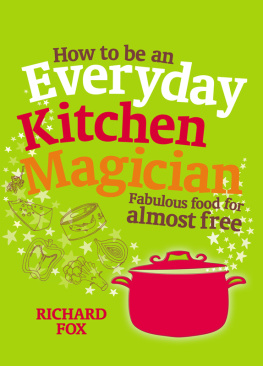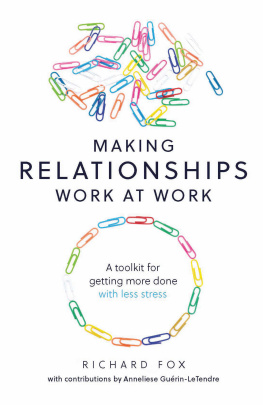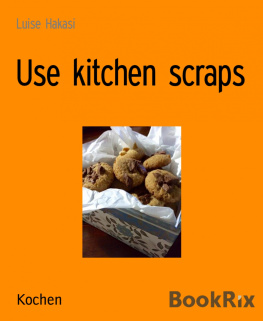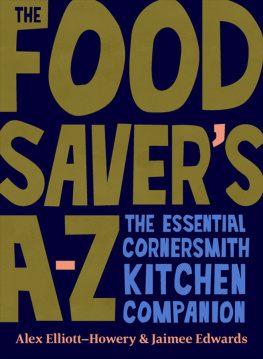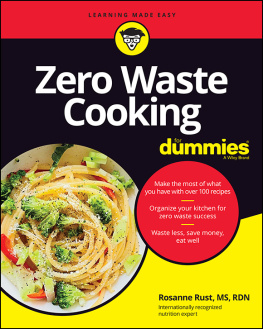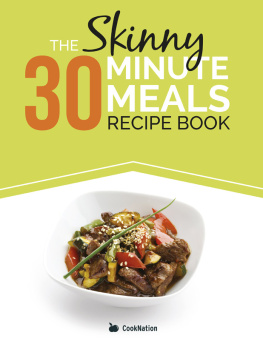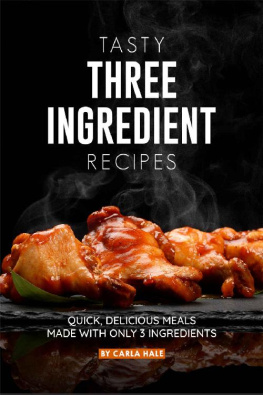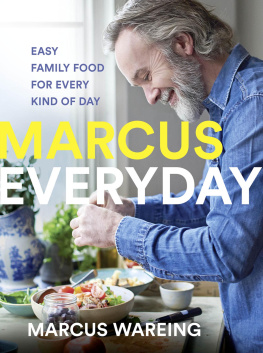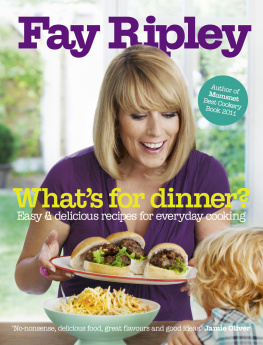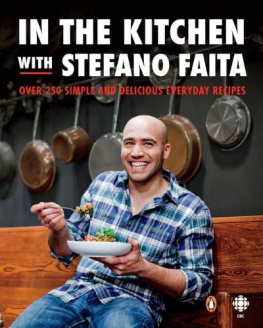
First published in 2012 by
Green Books
Dartington Space, Dartington Hall,
Totnes, Devon TQ9 6EN
2012 Richard Fox
All rights reserved
No part of this book may be used or reproduced in any manner without written permission, except in the case of brief quotations in critical articles or reviews.
All photographs are by the author, except:
page : T. Cumberland
pages : Jessica Holden
pages : JP Hedge Photography
pages : Jayne Jones
Design by Jayne Jones
Cover illustrations by Ellie Mains
Back cover photographs (top) by Jessica Holden
Print edition ISBN 978 0 85784 027 1
PDF format ISBN 978 0 85784 095 0
ePub format ISBN 978 0 85784 096 7
Authors note
For months, while I was compiling and writing this book, tucking into spontaneous lunches was delayed as I documented their creation and photographed the tantalising finished dishes before I could eat. Many of the recipes found in these pages represent actual forays into my fridge, freezer, cupboards and veg rack not just to illustrate the principles in the book, but to feed me as I laboured over keyboard and camera.
But you, the public, have had an enormous influence on the shaping of this book. Over the last couple of years I have given hundreds of cooking demonstrations, and after every one I invite questions and ask people to come and talk to me, one-to-one, with their queries, thoughts and culinary dilemmas. As such, I have built up a pretty comprehensive picture of the most common conundrums: what and how to re-use and re-heat; how to par-cook and cook-and-chill; what ingredients can and cant be put to use and have been able to enlighten and inform accordingly. All along my aim has been to help free you of the constraints of formal recipe cooking and to arm you with the techniques to create your own flavoursome concoctions with whatever you have available, without a second thought.
I hope this book will be a manual for inspiration and creativity -giving you the tools to be an everyday kitchen magician. The recipes should be seen simply as guidelines or reference points for creating your own bespoke dishes from your fridge contents, cupboard inhabitants and random leftovers. As such, there are numerous suggestions throughout for how a basic recipe concept can be added to, enhanced, adapted and personalised to create any number of tasty meals.
You, the public, have had an enormous influence, on the shaping of this book.
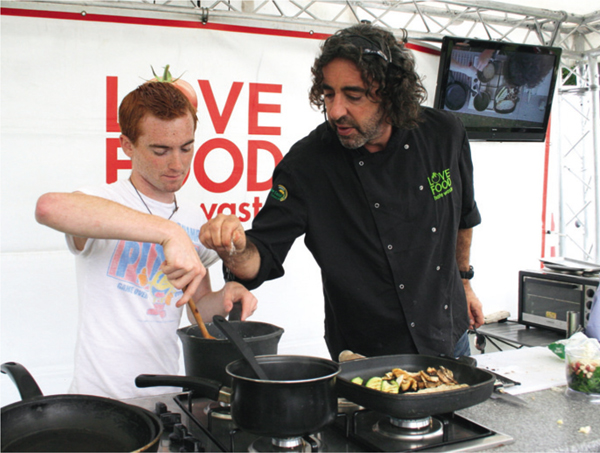
The author supporting The Nottinghamshire Waste Partnership campaign.
Introduction
This book is so much more than a recipe book. In fact, its about learning to cook without using recipes at all. Its all about making the most of what you have, reducing your waste dramatically, and learning how to create spontaneous, delicious dishes in minutes. It represents a food philosophy that will change your approach to cooking for ever, leaving you a better cook with more cash in your pocket. Its a journal of exploration, eureka discoveries and amazing taste sensations all generated through a series of shifts in my own thinking over years of tireless cooking demonstrations.
These pages are filled with ingredients and leftovers that many of us would throw away without so much as a second thought, purely because of an expired best before date or because that veg is looking just a little past it. Wrinkled peppers, greying carrots, bendy courgettes and blotchy celery are all part of the family of old-timers and has-beens that lives in the average household vegetable rack. (And lets not even go near the fridge salad drawer, lest we have a similar experience to Sigourney Weaver opening her refrigerator in Ghostbusters.) The truth is, however, that many of these tired-looking ingredients are not only perfectly usable but may actually be tastier than when in their pristine, supermarket-shelf condition. And what about those irresistible buy one get one free offers, which more often than not results in punnet-loads of perfectly good fruit being consigned to the bin?
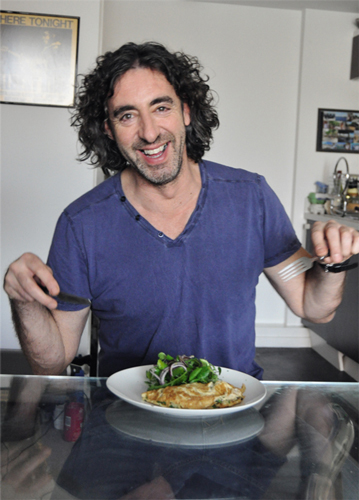
Right The perfect lunch in under 5 minutes.
Moreover while were on the subject of supermarket-aisle opportunities theres a host of thrifty and delicious dishes to be created from special-offer meat or fish, reduced in price as it approaches or hits its use by date. If you cant cook it at once, you can always stick it straight in the freezer.
Finally, how many times do we scrape leftover cooked food into the bin just because we cant possibly imagine what to do with a couple of florets of broccoli, two spoonfuls of spag bol or a quarter-tin of tuna? What can and cant be re-heated? How do we cool down safely (the food, that is), in order to re-heat at a later date? In light of this, Ive dedicated a whole chapter to cooked leftovers. The point is, why go out and buy yet more food when the chances are youve already got everything to hand to magic up something scrumptious?
Supporting roles in this book go to the dried herbs and spices hidden away in what Ive christened the scary cupboard which is, more often than not, also home to various flours and pulses, the like of which you probably cant even name, let alone cook. So, its time for a little demystification too. Face your fears, friends, and youll find they go away. And of course there are the tins, packets and jars (usually in the cupboard next to the scary one) that get overlooked or neglected on the basis of seeming just too bland, boring or complicated. Were going to change that little misconception too.
These pages are filled with ingredients and leftovers that many of us would throw away without so much as a second thought.
This book will show you how to turn the dull, the rejected and the disaffected into spectacularly tasty and attractive dishes of the sort that youd drool over in the finest gastro pub or restaurant, let alone relish as a spontaneous snack. Its not rocket science -in fact its all a lot easier and less stressful than navigating the supermarket aisles on a Saturday afternoon. Its been a fantastic journey for me, and one that has not only made me a better cook and financial manager but also more environmentally aware.
A few more words about ingredients in this book: when I refer to eggs, I am always talking about free-range. Wherever possible, Id encourage you to use sustainable fish and free-range meat. I dont advocate buying bargain-basement meat, but quality meat or fish is often bargain-priced as it approaches the date by which the supermarket has to ditch it. When I talk about seasoning, Im always referring to salt and pepper and preferably sea salt such as Maldon, and freshly ground black pepper. For frying, I use cold-pressed rapeseed oil. Failing that, you can now buy ordinary rapeseed oil, which will still do a top job and is substantially cheaper. Olive oil, when heated to a high temperature, creates trans fats not good. Keep ordinary olive oil for low-temperature sauting and the extra virgin for salad dressings, or for a dash over couscous, pasta or potato salad, or for making crostini and bread tart cases.
Aside from the fact that the ordinary so easily transforms into the extraordinary through everyday cooking processes, I would always encourage buying the best local and seasonal ingredients you can. Not only does this mean a huge reduction in those pesky food miles, but also that youre much more connected to where your food comes from and therefore have a greater sense of its value and are less likely to waste it. So, even though you may pay a little more for local produce, this fact alone will more than balance out the pennies.
Next page
